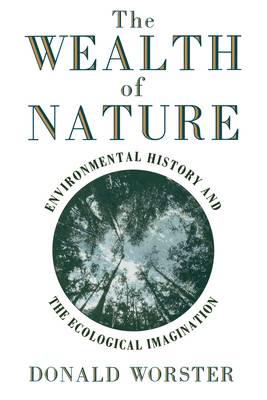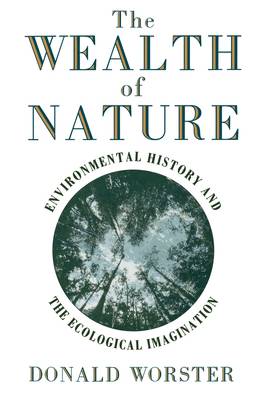
- Retrait gratuit dans votre magasin Club
- 7.000.000 titres dans notre catalogue
- Payer en toute sécurité
- Toujours un magasin près de chez vous
- Retrait gratuit dans votre magasin Club
- 7.000.0000 titres dans notre catalogue
- Payer en toute sécurité
- Toujours un magasin près de chez vous
Wealth of Nature
Environmental History and the Ecological Imagination
Donald Worster
Livre broché | Anglais
66,45 €
+ 132 points
Description
Hailed as "one of the most eminent environmental historians of the West" by Alan Brinkley in The New York Times Book Review, Donald Worster has been a leader in reshaping the study of American history. Winner of the prestigious Bancroft Prize for his book Dust Bowl, Worster has helped bring humanity's interaction with nature to the forefront of historical thinking. Now, in The Wealth of Nature, he offers a series of thoughtful, eloquent essays which lay out his views on environmental history, tying the study of the past to today's agenda for change.
The Wealth of Nature captures the fruit of what Worster calls "my own intellectual turning to the land." History, he writes, represents a dialogue between humanity and nature--though it is usually reported as if it were simple dictation. Worster takes as his point of departure the approach expressed early on by Aldo Leopold, who stresses the importance of nature in determining human history; Leopold pointed out that the spread of bluegrass in Kentucky, for instance, created new pastures and fed the rush of American settlers across the Appalachians, which affected the contest between Britain, France, and the U.S. for control of the area. Worster's own work offers an even more subtly textured understanding, noting in this example, for instance, that bluegrass itself was an import from the Old World which supplanted native vegetation--a form of "environmental imperialism." He ranges across such areas as agriculture, water development, and other questions, examining them as environmental issues, showing how they have affected--and continue to affect--human settlement. Environmental history, he argues, is not simply the history of rural and wilderness areas; cities clearly have a tremendous impact on the land, on which they depend for their existence. He argues for a comprehensive approach to understanding our past as well as our present in environmental terms.
"Nostalgia runs all through this society," Worster writes, "fortunately, for it may be our only hope of salvation." These reflective and engaging essays capture the fascination of environmental history--and the beauty of nature lost or endangered--underscoring the importance of intelligent action in the present.
The Wealth of Nature captures the fruit of what Worster calls "my own intellectual turning to the land." History, he writes, represents a dialogue between humanity and nature--though it is usually reported as if it were simple dictation. Worster takes as his point of departure the approach expressed early on by Aldo Leopold, who stresses the importance of nature in determining human history; Leopold pointed out that the spread of bluegrass in Kentucky, for instance, created new pastures and fed the rush of American settlers across the Appalachians, which affected the contest between Britain, France, and the U.S. for control of the area. Worster's own work offers an even more subtly textured understanding, noting in this example, for instance, that bluegrass itself was an import from the Old World which supplanted native vegetation--a form of "environmental imperialism." He ranges across such areas as agriculture, water development, and other questions, examining them as environmental issues, showing how they have affected--and continue to affect--human settlement. Environmental history, he argues, is not simply the history of rural and wilderness areas; cities clearly have a tremendous impact on the land, on which they depend for their existence. He argues for a comprehensive approach to understanding our past as well as our present in environmental terms.
"Nostalgia runs all through this society," Worster writes, "fortunately, for it may be our only hope of salvation." These reflective and engaging essays capture the fascination of environmental history--and the beauty of nature lost or endangered--underscoring the importance of intelligent action in the present.
Spécifications
Parties prenantes
- Auteur(s) :
- Editeur:
Contenu
- Nombre de pages :
- 272
- Langue:
- Anglais
Caractéristiques
- EAN:
- 9780195092646
- Date de parution :
- 27-10-94
- Format:
- Livre broché
- Format numérique:
- Trade paperback (VS)
- Dimensions :
- 159 mm x 234 mm
- Poids :
- 385 g

Les avis
Nous publions uniquement les avis qui respectent les conditions requises. Consultez nos conditions pour les avis.






